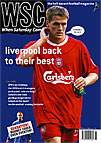 Belgium's 2002 World Cup captain has unusual plans for his post-football career: he will be in parliament by the summer, as Paul Knott explains
Belgium's 2002 World Cup captain has unusual plans for his post-football career: he will be in parliament by the summer, as Paul Knott explains
Of all the top players who left the international stage after the 2002 World Cup, none has been as missed in his own corner of planet football as much as the ex-captain of Belgium and national record holder for farming-related nicknames, Marc Wilmots.
In a starkly divided federal country, it is often said that the royal family and the Red Devils are the only two remaining unifying forces for French and Dutch speakers. This makes the national team captain a significant figure. To general surprise, Wilmots has decided to use his experience in this “soft” political role and popularity to return to the Belgian public eye by standing for parliament in the 2003 general election.
As national team captain “Wili the Tractor” played the role to perfection, personifying the qualities Belgians most admire. Brave, hardworking and down-to-earth, he has remained close to his roots as the son of a struggling small farmer. He is a genuine Belgian patriot, rather than solely a Walloon or Flemish one, and unusually for a Francophone can mumble the pre-match national anthem in fluent Dutch. This has combined with his marriage to a Flemish woman and devoted family-man lifestyle to give him rare appeal across the linguistic divide.
His reputation as a throwback to a bygone age of decency and dignity was further burnished during his World Cup swansong in the summer. After having a goal disallowed that would have seen Belgium take the lead against Brazil in the second round, he refused to complain, saying afterwards that “the referee told me he’d seen the video, thought that he might have made a mistake and apologised man to man. I respect his bravery in saying so and that’s good enough for me.” This noble approach was lovingly contrasted in the Belgian press with the toy-scattering antics of the Italians and Portuguese.
Wilmots’ reaction captured the popular mood perfectly: the Belgians’ history as a buffer state has taught them that being unfairly trampled on by larger nations on their way to seeking greater glory is inevitable and that the important thing is to suffer defeat honourably.
Following on from this, the “Fighting Boar” then turned down the chance of an emotional farewell club season with his former club Standard Liège, where his national coach and friend Robert Waseige was taking over. His reasoning was that Schalke 04 had paid him while he spent most of the previous season injured and were owed a big final effort in return.
Wilmots’ decision to pursue a career in politics perhaps casts these events in a different light. The World Cup referee’s subsequent denial of saying anything of the sort makes the former look like a dubious attempt at spin-doctoring. But finding a way to turn down Standard without causing offence shows exemplary judgement – Waseige was sacked after just six winless games.
Further surprise greeted the “Bull of Dongleberg’s” choice of political alignment: the Mouvement Réformateur (MR), a new grouping based around the francophone Liberal party. The Liberals are traditionally considered to be a middle-class party located on the Gaullist-style European centre-right. In so much as they were ever considered, Wilmots’ politics had previously been thought to be to the left of this. He has certainly been a firm and successful dressing-room shop steward, particularly during his time at Bordeaux and with the national team. But his hometown friendship with the MR’s leading light, Foreign Minister Louis Michel, combined with murmurings questioning national unity from some on the left have convinced him to join up with the Liberals.
He is expected to be named in fourth place on the MR’s party list for the next election, behind only Michel, the current Interior Minister and the head of one of the Movement’s other constituent parties. This should guarantee him a seat in the Belgian Senate.
Regardless of one’s political views, Wilmots’ willingness to sacrifice some popularity and professed desire to use his experience, energy and intelligence “to do something useful” rather than settling in to the easy life of a TV football pundit which beckoned has to be admired. If his previous career is anything to go by, the Belgian Parliament is about to gain a highly dedicated and responsible MP.
From WSC 193 March 2003. What was happening this month